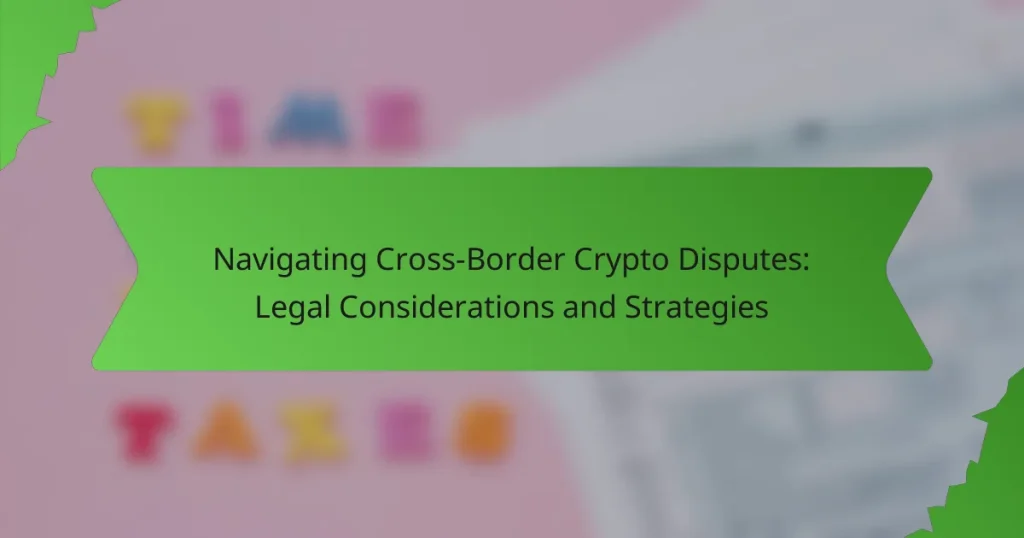Cross-border crypto disputes refer to conflicts arising from cryptocurrency transactions involving parties in different jurisdictions, often related to fraud, contract breaches, or regulatory compliance. The decentralized nature of cryptocurrencies complicates legal resolutions due to varying laws and a lack of a unified legal framework across countries. Key legal considerations include jurisdiction, regulatory compliance, and the enforceability of judgments, which can significantly impact dispute resolution. Mediation and arbitration are effective strategies for resolving these disputes, allowing parties to negotiate solutions outside traditional court systems. Engaging legal experts familiar with international crypto regulations is crucial for navigating these complexities and minimizing uncertainty.

What are Cross-Border Crypto Disputes?
Cross-border crypto disputes are conflicts that arise from cryptocurrency transactions involving parties in different jurisdictions. These disputes can involve issues such as fraud, contract breaches, or regulatory compliance. The decentralized nature of cryptocurrencies complicates legal resolutions. Jurisdictional challenges often arise due to varying laws across countries. Additionally, the lack of a unified legal framework for cryptocurrencies contributes to uncertainty. For example, different countries may have distinct regulations regarding cryptocurrency ownership and trading. This can lead to conflicting interpretations and enforcement of laws. As a result, resolving cross-border crypto disputes often requires legal expertise in multiple jurisdictions.
How do Cross-Border Crypto Disputes arise?
Cross-border crypto disputes arise from differing regulations across jurisdictions. These discrepancies can lead to misunderstandings regarding compliance and legality. For instance, one country may classify a cryptocurrency as a security, while another does not. This can create conflicts in transactions and ownership rights. Additionally, varying tax obligations can complicate cross-border transactions. Disputes may also stem from fraud or misrepresentation in international crypto dealings. The decentralized nature of cryptocurrencies often complicates jurisdictional authority. Finally, lack of clear legal frameworks in some regions can result in unresolved disputes.
What common scenarios lead to these disputes?
Common scenarios that lead to cross-border crypto disputes include contractual disagreements, regulatory compliance issues, and jurisdictional conflicts. Contractual disagreements often arise from differing interpretations of terms in crypto agreements. Regulatory compliance issues can occur when parties do not adhere to the laws of their respective countries. Jurisdictional conflicts emerge when it is unclear which country’s laws apply to a dispute. These scenarios can result in lengthy legal battles and financial losses. The rise of decentralized finance has further complicated these disputes, as traditional legal frameworks struggle to keep pace.
How do jurisdictional issues complicate these disputes?
Jurisdictional issues complicate cross-border crypto disputes by creating uncertainty about which laws apply. Different countries have varying regulations regarding cryptocurrencies. This inconsistency can lead to conflicting legal interpretations. For example, one jurisdiction may classify a cryptocurrency as a commodity, while another views it as a security. Such discrepancies hinder the resolution of disputes. Additionally, jurisdictional challenges can delay legal proceedings. Parties may face difficulties in enforcing judgments across borders. This complexity requires careful legal navigation to ensure compliance with multiple legal frameworks.
Why is it important to navigate Cross-Border Crypto Disputes?
Navigating cross-border crypto disputes is important due to the complexities of international law. Different jurisdictions have varying regulations regarding cryptocurrencies. This creates challenges in enforcing legal rights and obligations. Parties involved may face difficulties in determining applicable laws. Additionally, resolving disputes efficiently can minimize financial losses. It also helps in maintaining trust in the cryptocurrency ecosystem. Effective navigation can lead to more predictable outcomes in legal proceedings. The rise of global crypto transactions necessitates clear strategies for dispute resolution.
What are the potential consequences of unresolved disputes?
Unresolved disputes can lead to significant legal and financial consequences. They may result in prolonged litigation, which can drain resources and time. Parties involved may face increased legal fees and costs associated with court proceedings. Additionally, unresolved disputes can damage business relationships and reputations. This can lead to a loss of future opportunities and partnerships. In the context of cross-border crypto disputes, regulatory scrutiny may increase. This can complicate compliance and lead to further legal challenges. Ultimately, unresolved disputes can create an environment of uncertainty and risk for all parties involved.
How can effective navigation benefit stakeholders?
Effective navigation can significantly benefit stakeholders by enhancing clarity and reducing confusion. Clear navigation allows stakeholders to locate essential information quickly. This efficiency leads to faster decision-making processes. Improved navigation also fosters better communication among stakeholders. It helps in aligning expectations and responsibilities. Additionally, effective navigation can minimize errors and misunderstandings. This can result in cost savings and improved outcomes. Studies show that organizations with streamlined navigation experience higher stakeholder satisfaction.

What Legal Considerations are Involved in Cross-Border Crypto Disputes?
Legal considerations in cross-border crypto disputes include jurisdiction, regulatory compliance, and enforceability of judgments. Jurisdiction determines which country’s laws apply to a dispute. Different countries have varying regulations regarding cryptocurrencies. Regulatory compliance involves adhering to laws in each jurisdiction where parties operate. Enforceability of judgments refers to how well a court’s decision can be executed in another country. The lack of uniform regulations complicates these disputes. Additionally, issues like fraud and money laundering must be addressed under applicable laws. These factors significantly influence the resolution of cross-border crypto disputes.
How do international laws impact these disputes?
International laws significantly impact cross-border crypto disputes by establishing frameworks for jurisdiction and enforcement. These laws help determine which country’s regulations apply in a given situation. They also facilitate cooperation between nations in resolving disputes. For instance, treaties like the Hague Convention can provide mechanisms for the recognition and enforcement of foreign judgments. Additionally, international regulatory bodies, such as the Financial Action Task Force, set standards that influence national laws. Compliance with these standards can affect how disputes are handled. Countries that align with international laws are more likely to engage in effective dispute resolution. This alignment can enhance trust and cooperation among parties involved in cross-border transactions.
What treaties or agreements are relevant to crypto disputes?
Key treaties and agreements relevant to crypto disputes include the United Nations Convention on Contracts for the International Sale of Goods (CISG) and the Hague Convention on the Law Applicable to Contractual Obligations. The CISG provides a framework for international sales contracts, which can encompass crypto transactions. The Hague Convention addresses the choice of law in international contracts, offering clarity on legal jurisdiction. Additionally, bilateral investment treaties (BITs) may protect investments in cryptocurrencies across borders. These agreements help resolve disputes by establishing legal standards and frameworks for cross-border transactions.
How do different countries regulate cryptocurrency?
Different countries regulate cryptocurrency in various ways. Some nations have embraced it, while others impose strict regulations or outright bans. For example, the United States employs a decentralized regulatory approach. It involves multiple agencies, including the SEC and CFTC, each overseeing different aspects of cryptocurrency. In contrast, China has enacted a comprehensive ban on cryptocurrency transactions and initial coin offerings. This move aims to curb financial risks and maintain control over its financial system. Meanwhile, countries like Switzerland and Malta have established favorable regulatory frameworks to attract blockchain businesses. These nations provide clear guidelines and legal certainty for cryptocurrency activities. Overall, the global regulatory landscape for cryptocurrency is diverse and continually evolving.
What role do local laws play in Cross-Border Crypto Disputes?
Local laws significantly influence cross-border crypto disputes. They determine jurisdiction, applicable legal standards, and enforcement mechanisms. Each country has its own regulatory framework for cryptocurrencies. These regulations can vary widely, affecting how disputes are resolved. For instance, some jurisdictions may recognize crypto as property, while others may classify it as currency. Local laws also dictate the legal rights of parties involved in the dispute. Compliance with local laws is essential for the legitimacy of any legal proceedings. Therefore, understanding local laws is critical for effective dispute resolution in the crypto space.
How can local laws affect dispute resolution outcomes?
Local laws significantly influence dispute resolution outcomes by establishing the legal framework within which disputes are addressed. Different jurisdictions have varying regulations regarding arbitration, mediation, and litigation processes. These laws dictate the enforceability of contracts, the admissibility of evidence, and the procedural rules that govern dispute resolution. For instance, some jurisdictions may favor arbitration as a quicker, more cost-effective method, while others may require disputes to be resolved through the court system. Additionally, local laws may define the rights and obligations of parties involved in a dispute, impacting the strategies they employ. The choice of law and jurisdiction can also determine the applicable legal standards, which can lead to different outcomes based on location.
What are the challenges posed by varying legal frameworks?
Varying legal frameworks create significant challenges for cross-border crypto disputes. Different jurisdictions have distinct regulations governing cryptocurrency. These discrepancies can lead to confusion about compliance requirements. Companies may face legal risks when operating in multiple countries. Enforcement of laws can vary widely, complicating dispute resolution. Jurisdictional conflicts may arise when determining which laws apply. Additionally, legal interpretations of cryptocurrency can differ, affecting asset classification. This inconsistency can hinder international cooperation and create barriers for businesses.

What Strategies Can Be Employed to Resolve Cross-Border Crypto Disputes?
Mediation and arbitration are effective strategies for resolving cross-border crypto disputes. These methods allow parties to negotiate solutions outside of traditional court systems. Mediation involves a neutral third party facilitating discussions between disputing parties. Arbitration, on the other hand, results in a binding decision made by an arbitrator. Both approaches can reduce costs and time compared to litigation. Additionally, utilizing smart contracts can automate dispute resolution processes. Jurisdictional clarity is also essential; parties should agree on the governing law and jurisdiction in advance. This agreement minimizes uncertainty and potential conflicts. Finally, engaging legal experts familiar with international crypto regulations can provide valuable guidance.
How can mediation and arbitration be utilized in these disputes?
Mediation and arbitration can be utilized in cross-border crypto disputes as effective alternative dispute resolution methods. Mediation involves a neutral third party facilitating communication between disputing parties to reach a mutually agreeable solution. This process is often faster and less formal than litigation, making it suitable for the dynamic nature of crypto-related issues.
Arbitration, on the other hand, involves a neutral arbitrator making a binding decision after hearing both parties’ arguments. This method provides a definitive resolution, which can be crucial in the fast-paced crypto environment. Both mediation and arbitration can be tailored to the specific needs of the parties involved, allowing for flexibility in procedures and outcomes.
According to the International Chamber of Commerce, arbitration is increasingly favored in international disputes due to its confidentiality and enforceability under the New York Convention. This makes it particularly relevant for crypto disputes that often cross multiple jurisdictions. Mediation can preserve business relationships, which is essential in the collaborative crypto industry.
What are the advantages of mediation over litigation?
Mediation offers several advantages over litigation. Mediation is generally faster than litigation. It can resolve disputes in weeks or months, while litigation may take years. Mediation is also more cost-effective. The expenses associated with mediation are typically lower than those of court proceedings.
Additionally, mediation allows for more control over the outcome. Parties can negotiate terms that suit their needs, unlike a judge’s ruling. Mediation fosters better communication and relationships. This collaborative approach can preserve business relationships that litigation may damage.
Moreover, mediation is confidential. Unlike court cases, which are public, mediation discussions remain private. This confidentiality can protect sensitive information. Lastly, mediation often leads to higher satisfaction rates. Studies show that parties are more likely to comply with agreements reached through mediation.
How does arbitration differ from traditional court proceedings?
Arbitration differs from traditional court proceedings primarily in its process and structure. Arbitration is a private dispute resolution method. It allows parties to choose their arbitrators and set procedural rules. Traditional court proceedings are public and follow strict legal protocols. In arbitration, decisions are usually final and binding, with limited grounds for appeal. Court decisions can be appealed in higher courts, providing more opportunities for review. Arbitration can be faster and less formal than court cases. According to the American Arbitration Association, arbitration can reduce dispute resolution time significantly compared to traditional litigation.
What best practices should be followed when navigating these disputes?
Establish clear communication with all parties involved in the dispute. This fosters understanding and reduces misunderstandings. Document all interactions and agreements meticulously. This provides a clear record to refer back to if needed. Engage legal counsel familiar with cross-border crypto regulations. Their expertise can guide compliance with relevant laws. Utilize alternative dispute resolution methods, such as mediation or arbitration. These methods can be more efficient and less costly than litigation. Stay informed about the legal landscape in all jurisdictions involved. Laws regarding crypto can vary significantly across borders. Prioritize transparency in all dealings. This builds trust and can lead to more amicable resolutions.
How can parties prepare for potential disputes in advance?
Parties can prepare for potential disputes in advance by establishing clear contracts. These contracts should outline roles, responsibilities, and dispute resolution mechanisms. Specifying jurisdiction and applicable law can reduce ambiguity. Including arbitration clauses can facilitate quicker resolutions. Regular communication between parties can help identify issues early. Documenting all transactions and agreements provides a clear record. Training staff on dispute resolution can improve preparedness. Utilizing legal counsel for contract review ensures compliance with regulations.
What are common pitfalls to avoid in Cross-Border Crypto Disputes?
Common pitfalls to avoid in cross-border crypto disputes include jurisdictional issues, lack of legal clarity, and inadequate documentation. Jurisdictional issues arise when parties are uncertain about which country’s laws apply. This uncertainty can lead to conflicting legal interpretations. Lack of legal clarity in crypto regulations can complicate dispute resolution. Many countries have different regulations regarding cryptocurrencies. Inadequate documentation can hinder a party’s ability to prove their claims. Proper records of transactions and agreements are essential for resolution. Failing to understand the regulatory environment can result in non-compliance. This can lead to penalties or unfavorable outcomes in disputes. Understanding these pitfalls is crucial for effective dispute navigation.
What resources are available for resolving Cross-Border Crypto Disputes?
Resources for resolving cross-border crypto disputes include international arbitration, mediation services, and legal frameworks. International arbitration provides a neutral ground for parties to settle disputes outside of traditional courts. Mediation services offer a collaborative approach to reach mutually agreeable solutions. Legal frameworks involve regulatory bodies that establish guidelines for crypto transactions. Additionally, specialized legal firms and consultancies focus on crypto-related disputes. These resources help navigate the complexities of differing jurisdictions and legal interpretations in the crypto space.
How can legal professionals assist in these matters?
Legal professionals can assist in navigating cross-border crypto disputes by providing expert legal advice and representation. They can help clients understand the complexities of international laws governing cryptocurrencies. Legal professionals can also facilitate communication between parties in different jurisdictions. They assist in drafting and reviewing contracts related to crypto transactions. Furthermore, they can represent clients in arbitration or litigation when disputes arise. Legal professionals are equipped to interpret regulatory compliance issues in various countries. They can also provide guidance on dispute resolution mechanisms that are most effective in crypto-related matters. Their expertise ensures that clients are informed of their rights and obligations in a rapidly evolving legal landscape.
What online platforms facilitate dispute resolution in cryptocurrency?
Online platforms that facilitate dispute resolution in cryptocurrency include Kleros, Bitrated, and OpenBazaar. Kleros uses decentralized arbitration to resolve disputes through a jury of users. Bitrated allows users to create escrow services and utilize reputation systems for dispute resolution. OpenBazaar offers a peer-to-peer marketplace with built-in mediation services. These platforms leverage blockchain technology to ensure transparency and security in the resolution process. They provide mechanisms for users to resolve conflicts without traditional legal systems.
Cross-border crypto disputes refer to conflicts arising from cryptocurrency transactions involving parties in different jurisdictions, often complicated by varying regulations and legal frameworks. This article outlines the nature of these disputes, common scenarios that lead to them, and the jurisdictional issues that arise. It also examines the importance of navigating these disputes effectively, potential consequences of unresolved conflicts, and strategies such as mediation and arbitration. Legal considerations, including international laws and local regulations, are discussed, along with best practices for dispute resolution and resources available for stakeholders.




